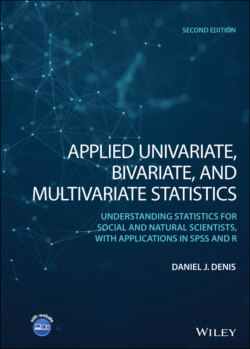Читать книгу Applied Univariate, Bivariate, and Multivariate Statistics - Daniel J. Denis - Страница 25
Further Discussion and Activities
Оглавление1 1.14. William of Ockham (c. 1287–1347) is known for his infamous principle Ockham's razor, which essentially states that all things equal, given competing theories accounting for the same data, the simpler theory is the better theory. In other words, complex explanations for phenomena that could be explained by simpler means are not encouraged. Read Kelly (2007), and evaluate the utility of Ockham's razor as it applies to statistical modeling. Do you agree that the simpler statistical model is usually preferred over the more complex when it comes to modeling social phenomena? Why or why not?
2 1.15. Read Kuhn (2012). Discuss what Kuhn means by normal science and the essence of what constitute paradigm shifts in science.
3 1.16. As briefly discussed in this chapter, statistical control is not the same thing as experimental control or that of a control group. Read Dehue (2005), and provide a brief commentary regarding what constitutes a real control group versus the concept of statistical controls.
4 1.17. It was briefly discussed in the chapter potential problems with using the word cause or speaking of causality at all when describing findings in the social and (often) natural sciences. The topic of causality is a philosopher's career and a scientist's methodological nightmare. Epidemiology, the study of diseases in human and other populations, has, like so many other disciplines, had to grapple with the issue of causation. For example, if one is to make the statement smoking causes cancer, one must be able to defend one's philosophical position in advancing such a claim. Not everyone who smokes gets cancer. Further, some who smoke the most never get the disease, whereas some who smoke the least do. Tobacco companies have historically relied on the fact that not everyone who smokes gets cancer as a means for challenging the smoking‐cancer “link.” As an introduction to these issues, as well as a brief history of causal interpretations, read Morabia (2005). Summarize the historical interpretations of causality, as well as how epidemiology has generally dealt with the problem of causation.
5 1.18. Models are used across the sciences to help account for empirical observations. How to best relate mathematical models to reality is not at all straightforward. Read Hennig (2009), and discuss Hennig's account of the relation between reality and mathematical models. Do you agree with this account? What might be some problems with it?
